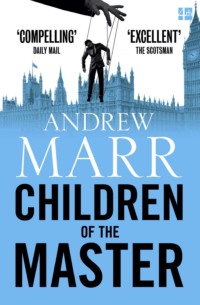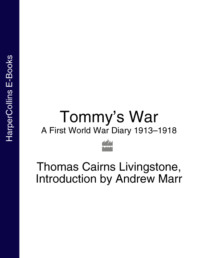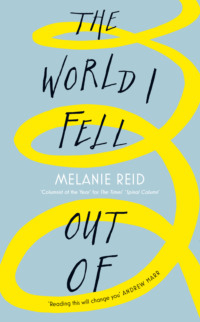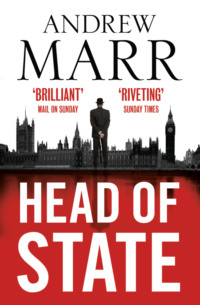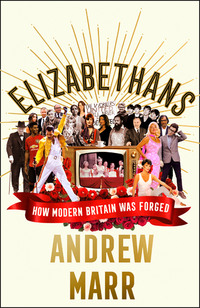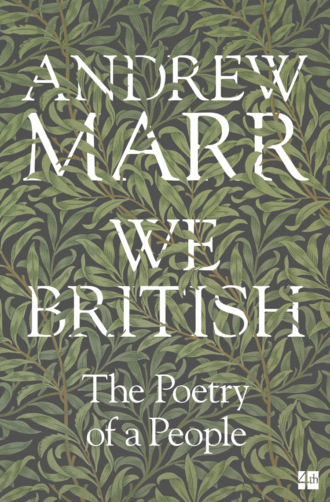
Полная версия
We British: The Poetry of a People


Copyright
4th Estate
An imprint of HarperCollinsPublishers
1 London Bridge Street
London SE1 9GF
www.4thEstate.co.uk
First published in Great Britain by 4th Estate 2015
Text © Andrew Marr 2015
Cover image © ‘Willow Bough’ wallpaper design, 1887, Morris, William (1834–96)/Private Collection/Bridgeman Images
Andrew Marr asserts his moral right to
be identified as the author of this work
A catalogue record for this book is
available from the British Library
All rights reserved under International and Pan-American Copyright Conventions. By payment of the required fees, you have been granted the non-exclusive, non-transferable right to access and read the text of this e-book on screen. No part of this text may be reproduced, transmitted, downloaded, decompiled, reverse engineered, or stored in or introduced into any information storage retrieval system, in any form or by any means, whether electronic or mechanical, now known or hereinafter invented, without the express written permission of HarperCollins e-books.
Source ISBN: 9780008130893
Ebook Edition © October 2015 ISBN: 9780008130916
Version: 2016-07-18
Contents
Cover
Title Page
Copyright
Dedication
Introduction
1 The Earliest English Poetry
2 Knights in Green Satin
3 Fanatics and Courtiers
4 England’s Miracle
5 Beyond the Nymphs and Swains: Renaissance Realities
6 Nothing Left But Laughter? Britain’s Mullahs Confront the Problem of Pleasure
7 The Restoration of What? Satire, Science and Cynicism, as Political Britain is Born
8 The Age of Reason. And Slavery, and Filth, and So On
9 The Revolution
10 Romantic Agonies
11 The British Age
12 Plush, Mush and a Handful of Titans
13 The Poets of More Than One War
14 How Modern Were the Modernists?
15 Lefties and Righties: Outrage and Laughter in Britain Between the Wars
16 Revolt Against the Metropolis: Britain in the 1940s and 50s
17 The Age of Larkin
18 Fresh Freshness
19 Celts, Britons and Their Friends: Modern British Poetry Furth of England
20 Here Comes Everybody: The British and Poetry Now
Acknowledgements
Index of Poets
Also by Andrew Marr
About the Publisher
Dedication
For Emily, a poetry reader
I would also like to thank Gwyneth Williams, Controller of Radio 4, who believed in this project; and James Cook, who led the ‘takeover’ of the channel for National Poetry Day, 8 October 2015
Introduction
Beyond the village, there’s some marshy ground. There, on a warm evening, a horny, lonely man is making rhythmic noises and shuffling his feet. Inside his head there’s a kind of music, and what he’s doing is trying to fit words to it, words that express his feelings for a woman – too good for him – living in the village.
A few centuries later there’s another man, who feels he has let down God and is facing eternal hellfire. Yet he’s a kindly man, of gentle disposition, and somehow feels that God can’t be as pitiless as the Church elders suggest. So, with a goose quill and a sheaf of rough paper, he is dipping into ink and writing down a kind of private, rather bouncy, prayer. He too is humming.
Then there is the woman in a foul dungeon, throbbing with pain from her torture, dictating to a shabby priest her defiant poem against the authorities.
There will be many more women – rich, in chambers coloured with stained glass, protected against the cold by animal skins; and poor, living in twentieth-century London, struggling with wailing children and an absent man. And many, many more men, too – Irish mystics, Scottish farmers, West Country priests, a Warwickshire actor – all doing the same thing, setting the words to rhythm, tightening them together like the ropes on a fast-moving yacht, trying to build a compact, thrumming little engine of meaning out of the sprawling magic of the English language.
Palaeo-archaeologists, who study early man, tell us that the rhythm and the music came first. Dances, perhaps led by tribal shamans, would be used to bind the people together and to express defiance of the surrounding dark and danger. To keep the beat, it was natural to hum, sing or shout. And at some point it seemed a good idea to add words. The earliest Greek tragedies, with their choruses, music and masks, give us some notion of where poetry came from.
The first poets that we know were read and discussed on the archipelago of islands we call British would have been the Latin poets of the Roman Empire. It’s most unlikely that the Bronze Age tribes – technically competent people, farmers and metalworkers, miners and traders – didn’t have their own poetry. But we know nothing about it. The Romano-British, however, would have had their Virgil and their Martial, and indeed their Greeks as well; there would have been poetry recitals in the villas of Sussex, and dirty, clever ditties murmured along Hadrian’s Wall.
Eventually, with the scouring of invasion and the countersweep of resistance, with defeats and victories, the ethnic make-up of the British changes, and we begin to see a new language emerging from the clash of the Germanic tongues of invaders, and the Celtic speech, by now mingled with Latin, of the resisters. Like a perpetual bubbling broth, new ingredients will be added again and again through the centuries – Norse Viking, French, Italian and Spanish, Indian and Arabic. This linguistic paella will become the world’s most extensive and flexible human tongue, used by generations of British people to express their strongest innermost feelings, their delight in the world, their loves and their terrors. Most human cultures seem to have specialities, for which they are particularly admired. What would Germany be without its music, or Italy without its painters and architects? The British have never had a musical tradition to rival that of Russia or Germany; or the gloriously exuberant architecture of Paris or Rome; or the coherent worldview of classical China. What they have had is the richest and most remarkable tradition of poetry of any major culture. The ‘nest of singing birds’ remains at the heart of the British achievement – more important, I’d say, than empire or even the extraordinary British leaps forward in science.
What follows is an attempt to use British poetry as the framework for a kind of alternative epic, the story of what it was like to be British, told through poetry, and sometimes through the stories of the poets.
Hundreds of thousands of Britons have left traces of what it was like to be ‘me in particular’ – letters, drawings, works of art of all kinds, text messages, emails and social-network exhibitionism. Yet poetry is special. It’s the most intimate and direct communication mankind has so far discovered. When it works – and quite often it doesn’t – it can have an intensity and an interiority unmatched by anything else. When Shakespeare describes the accumulated guilt and despair of the murderer Macbeth, we see and hear a mind working in a way that seizes us still in the twenty-first century. We can read about the catastrophe of the First World War; but to feel what it was like to be there, even now, we don’t turn first to the film-makers but to the poets. Those are rather obvious examples. But unlike texts, emails or television, poetry allows people from distant times to talk directly to us, with nobody else getting in the way: a medieval ploughman, a Tudor drunk or a jilted Georgian woman can look us straight in the eyes.
Writing this in 2015, I’m acutely conscious that the very word ‘British’ has become controversial. Many of my fellow Scots would far prefer an epic of the Scots in verse – and they can indeed find that. England, happily or otherwise, seems to be beginning to find its own voice again: many contemporary historians now focus unashamedly on the story of England, when perhaps even a decade or two ago they would have automatically reached for Britain.
If I restricted what follows to poetry written in English, however, I’d be in a quandary. The ‘Inglis’ tongue was established across much of southern Scotland by the early medieval period – even the patriotic epic about Robert the Bruce is written in a language which owes much more to the Saxon–French mangling we call English than to Gaelic. Scotland’s greatest poets – Dunbar, Henryson, Douglas, Fergusson, Burns, Scott and MacDiarmid – wrote at least sometimes in English; and when there was a determined attempt to return to the older Scottish versions of English in the twentieth century, the prickly ‘Scots’ that emerged was still a cousin of English. The same is true of the other Celtic nations: how could a survey of English poetry ignore Swift, Yeats and Dylan Thomas?
There is no political agenda in this book, though many of the experiences of the people across the archipelago have been similar. The Vikings arrived on the coasts of all of Britain, and settled in the Orkney and Shetland Islands, Dublin, the Isle of Man and the Gower Peninsula, as well as York and most of eastern England. The rage of the Reformation arrived in full force in Scotland, as well as England; plagues did not discriminate; nor changes in agriculture; nor many of the wars. So a lot of the British experience has been common, and I aim to reflect that. I also hope to include much that is specific to different parts of these islands.
And I have deliberately called this a ‘British’, not an ‘English’, epic, because I’m well aware that so much great poetry has been composed in other languages on these islands. There is a tradition of Gaelic poetry in Scotland, and Irish poetry in Ireland, and the work of the great Welsh bards. The fact that so much of this was transmitted orally, and lacks clarity about its authorship, doesn’t mean it should be excluded. So where I can, I’m going to use non-English British poetry in translation. I wish there was more of it; but that’s the fault of the rot and the rain, not mine. It also means that I will use translations where otherwise modern readers would struggle – thus, of Anglo-Saxon poetry, poetry in dialects from Cheshire to Northumbria, and a little Latin poetry too.
Some say poetry today, in the twenty-first century, is going through a revival; others insist that it’s in terminal decline. I suppose that has always been the case. But the very source of the problem is how we hear and absorb poetry. These days most of us come across poetry on the printed page, though many of us were brought up with nursery rhymes recited to us. The story of poetry and the story of writing are closely connected, but historically poetry has more often been an oral art, heard rather than read. Even today some poets refuse to print their work, but insist that it can only be enjoyed properly at a live reading. So radio, as the prime spoken-word medium, even today, is the obvious place for this epic. What you are reading is the longer, book-length version of the takeover of BBC Radio 4 for a whole day. Poetry is going to elbow itself into programmes like Today, refusing to take no for an answer. It’s going to lounge and sprawl between news and weather bulletins, with readings from around the whole country, and poems going back well over a thousand years in time.
This book includes some of the greatest of our poetry, including much that is far too little-known. I hope that it adds up to a new way of thinking about who we have been, and who we are now. I hope, as you come on the journey with me, you will find it surprising, uplifting, and at least a little disorientating.
1
The Earliest English Poetry
It begins in Yorkshire, on the coast by Whitby, in the year 657. Peat-smoke, the sound of waves and gulls, and winding through them the music of a harp, and words chanted in a language and a dialect so far-away we can barely understand one of them.
Nu sculon herigean heofonrices Weard,
Meotodes meahte on his modgeðanc,
weorc Wuldorfæder, swa he wundra gehwæs,
ece Drihten, or onstealde.
He ærest sceop eorþan bearnum
heofon to hrofe, halig Scyppend;
þa middangeard moncynnes Weard,
ece Drihten, æfter teode
firum foldan, Frea ælmihtig.
It’s a very simple little hymn, and the traditional starting point for English poetry. Later on, we’re going to hear a lot from the educated and self-confident elite of the British countries, poets from the great cities and the courts of barons and kings. But we start with a middle-aged man, Caedmon, whose name isn’t English – it might be Celtic – and who was a herdsman looking after bullocks and heifers before he joined the great monastery of Abbess Hild as a farm labourer.
He was too shy to take his turn singing poems with the other labourers and monks, and retired to a stable where he fell asleep and had a vision in which he was told to sing about God. His story was told to the abbess, who commanded him to sing, with wonderful results.
We know about all of this because of the great chronicler Bede, who was working in Jarrow just fifty years after it all happened. Bede insists, again and again, on the remarkable nature of what Caedmon did. Why? In modern translation his hymn sounds pious but almost blandly straightforward:
Now we must praise the Guardian of Heaven,
the might of the Lord and his purpose of mind,
the work of the Glorious Father; for he,
God Eternal, established each wonder,
he, Holy Creator, first fashioned
heaven as a roof for the sons of men.
Then a Guardian of Mankind adorned
this middle earth below, the world for men,
Everlasting Lord, Almighty King.
This hardly seems like the beginning of the great story of English poetry. But almost everything about it should unsettle our sense of who we are, right at the beginning.
Let’s start with the obvious, the Christian theme of the poem. Caedmon’s world had been, until relatively recently, a pagan one. Christianity had arrived in Britain long before, towards the end of the Roman era; and it was strongly established in Wales, Ireland and western Scotland, in the Celtic Church whose rites went back to early Rome. Since then, however, the waves of Germanic invaders – Angles from Denmark and northern Germany, the Saxons and the Jutes – had pushed the old Romano-British and Celtic inhabitants to the west, re-establishing paganism as they slaughtered, and then settled.
Now, Northumbria, one of the new and powerful Germanic kingdoms of Britain, was being reintroduced to the religion of Christ by missionaries from the Scottish island of Iona, themselves originally Irish. In modern times, we often assume that new ideas bubble up from the south and move north – and for centuries the Celts and the Irish were regarded by the southern English as barbarians. All wrong: right here at the beginning of the story, the new Christian religion had been brought southwards and eastwards from the north and west. Caedmon’s monastery itself had been founded by Irish monks.
Eventually, a different form of Christianity would push up across the Channel, and establish a new base at Canterbury, after Pope Gregory I sent Bishop Augustine to the court of King Aethelbert of Kent in 596. But when our ploughman made his poetry he was living in the Celtic religious world, not the English one. Caedmon’s Northumbria, with its monasteries at Lindisfarne, Whitby and Jarrow, was a great European centre of learning until it fell to the Vikings. And if many today think of Canterbury as the natural home of ‘English Christianity’, let’s remember that Canterbury’s power owed much to the arrival of a Greek, Theodore, and a North African monk, Hadrian.
Caedmon’s Britain was differently shaped from today’s state. After the withdrawal of the Roman Empire, the islands were a hodge-podge of tiny warring statelets: warlords passed power to their children and established royal dynasties. These slowly congealed into larger kingdoms. The great ethnic division was between the Celtic or British people still surviving in the west and north, and their enemies, the immigrant Germanic tribes of the south and east. Today ‘Welsh’ describes the land and the people to the west of Offa’s Dyke, the smallest of the nations of Britain. But around the time Caedmon was writing, the ‘Welsh’ were everywhere. There was for instance a kingdom of Welsh-speaking people to the north, centred on Edinburgh, fighting for their survival against the Saxons of Northumbria.
The tragic war poem about their failure and slaughter, Y Goddodin, is considered one of the earliest Welsh poems; it’s classic, heroic-battle-against-the-odds stuff, though it perhaps didn’t help its three hundred heroes that they had spent a year getting drunk on mead before they finally went into battle. Although the Anglo-Saxons and the Scandinavians were pushing the British or Celtic people back, there was no sense that one side was more cultured than the other. The heroes of Goddodin seem, as it happens, to have been Christians fighting pagans.
Does any of this matter much? Only because we need to shake up our ideas about what the very words ‘British’, ‘English’ or ‘Welsh’ mean. This was a harried, violent and marginal archipelago in which the offer of Christianity spread remarkably fast because it promised a happy and tranquil life after death – a great alternative to the cold, dangerous and relatively short experience of life in Northumbria, or anywhere else.
But it would also be a mistake to think of Caedmon’s Britain as simply a wilderness of macho warlords. Note, for a start, that he answered not to a man, but to a woman – the abbess. For much of the Anglo-Saxon period, religious institutions for men and women existed side by side, with female religious leaders highly literate and, in their own way, powerful. Very little writing by them has survived, but we know enough to understand that in the world of the Church, at least, women could be as powerful as princesses. Second, from artworks that have survived, in gold hoards or the glorious illuminated manuscripts, we know that the Britain of Caedmon’s time had a highly developed artistic sense; its people valued intricacy, complexity and show-off display. Although in translation his hymn may seem simple enough to us, in the original Anglo-Saxon it was a dazzling weave of assonance and rhythm, as carefully wrought as a letter colourfully inscribed in the Lindisfarne Gospels.
So, what of the language itself? I’ve called it Anglo-Saxon, and that’s the term most scholars would use; but that’s a very loose description of something that was in fact written in a specific Northumbrian dialect.
The marvel of Caedmon, according to Bede, was that he could pour out poetry while being, by the standards of the day, an uneducated man. In other words, he didn’t speak Latin. Today we are used to thinking of Latin as the dry, dead, elite language of scholars and priests. Back then it was still the left-behind language of the Roman Empire, heard all over the place. In fact, it seems to have been more used in the west and the north than in the south.
Bede said Britain had five languages: English, by which he meant the Germanic dialects of Anglo-Saxon; British, close to what we would call Welsh; Irish; Pictish – another ancient British language from Scotland, now vanished; and Latin, which he said ‘is in general use among them all’.
Latin was the language of the monasteries; yet it is only thanks to the monasteries that we have any early English surviving at all. In fact a single book, presented to Exeter monastery around 1070, contains the single greatest trove of Anglo-Saxon poetry, in a mishmash of Germanic dialects. This is a language which takes root for just long enough that it can’t be torn up again by the next wave of invaders, the Scandinavian Vikings; and it’s still buried inside the mouths of everyone who speaks modern English today.
Caedmon’s world, the great, humane monasteries of the north-east, would soon be obliterated. In the Anglo-Saxon Chronicle the record for the year 793 reads:
Dire portents appeared over Northumbria and sorely frightened the people. They consisted of immense whirlwinds and flashes of lightning, and fiery dragons were seen flying into the air. A great famine immediately followed those signs, and a little after that in the same year, on 8 June, the ravages of heathen men miserably destroyed God’s church on Lindisfarne, with plunder and slaughter.
Eventually Caedmon’s tongue found its defender in the Anglo-Saxon kingdom of Wessex. Meanwhile, the thread of human thought and communication ran mainly in Latin. Even the old British scripts used for cutting language into stone and onto slate, runes and ogam were simplified versions of Latin letters. So having no Latin in a monastery was, even for a cowherd, a huge disability. What was miraculous to Caedmon’s contemporaries was that he used the earthy, rhythmic old German way of making poetry and applied it directly to a religious subject.
I hope it’s obvious by now that Caedmon wouldn’t have thought of himself as English – England as a country name didn’t yet exist. His very name is probably Celtic, and alongside the Irish he’d have known in his monastery there were almost certainly Scandinavians too. It wasn’t at all obvious that the west Saxons and their language would eventually triumph, or that the people of the biggest bit of the archipelago would one day call themselves English. Politically, everything was still up for grabs. We know this by looking at other early poems. For instance, ‘The Battle of Maldon’ is about a defeat of the English by the Danes, while ‘The Battle of Brunanburg’ describes a close-run-thing victory by Aethelstan, the ruler of Wessex, often described as the first King of England, over an alliance between the Viking King of Dublin, the King of the Picts and the Scots.
As the relentless warfare went on, almost everywhere Christianity was gaining ground. But outside the monasteries, almost everywhere, the older beliefs remained potent. This was a world still confused about the contradictions between the old Norse warrior culture, which was pagan and toughly pessimistic, and Christianity. The enormous poem Beowulf – not even set, by the way, in Britain but in Denmark – is famously confused between its Christian vision and its pagan funerals. Beowulf is famous but it’s not much fun, except in the modern translation and rewriting by Seamus Heaney. Instead, here’s something from the wonderful ecstatic poem ‘The Dream of the Rood’, in which the anguish of daily life is confronted by God Almighty, who seems to be something like a young Saxon chieftain:
then the young warrior, God Almighty,
stripped himself, firm and unflinching. He climbed
upon the cross, brave before many, to redeem mankind.
I quivered when the hero clasped me …
… now I look day by day
for that time when the cross of the Lord,


